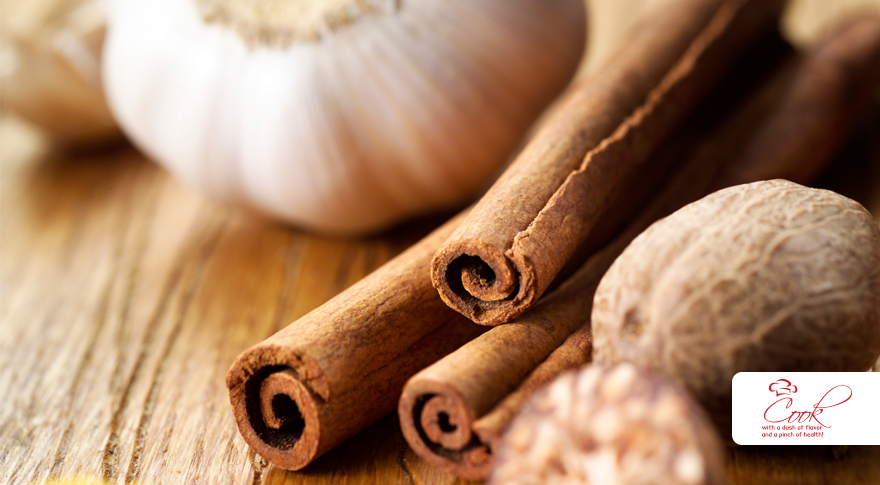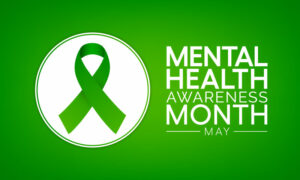Cinnamon
What do Moroccan couscous, Spanish flan, Mexican hot chocolate and mango chutney have in common? Cinnamon. Known as dalchini in Urdu and Hindi, cinnamon has been used as a spice in both sweet and savory foods for over 4,000 years. It originated in South East Asia and is derived from the bark of the cinnamon tree. Cinnamon can be found in grocery shops and specialty stores around the world in the form of powder, stick (or bark) and oil. This spice is ubiquitous in Asian cultures and cuisines. Popular South Asian dishes including curries, rice and desserts contain cinnamon. It is also a key ingredient in garam masala and traditional chai is infused with a stick of cinnamon. Cinnamon is an easy spice to use and cooks around the world can be creative by reducing the amount of salt and sugar, adding cinnamon instead for flavor.
When using cinnamon spice in daily cooking, it is considered safe up to 6 grams per day (approximately 2 teaspoons in powder form). Suggestions for incorporating cinnamon include
- Adding a stick of cinnamon to all favorite rice dishes and curries;
- Sprinkling ground cinnamon on French toast, oatmeal or cereal;
- Adding a pinch of ground cinnamon to desserts and snacks such as muffins, breads, yogurt and custard;
- Flavoring tea with a stick of cinnamon;
- Topping fruits and vegetables, such as apples and sweet potatoes, with ground cinnamon.
While the culinary uses of cinnamon are well documented, the health benefits of cinnamon are not as widely known. Cinnamon has traditionally been suggested to help with many ailments. For example, oil of cinnamon (or cassia) combined with honey, can help relieve a sore throat. Also, rubbing cinnamon oil onto the temples can ease headaches. Additionally, cinnamon may lower blood glucose, triglycerides and LDL cholesterol in individuals with Type 2 diabetes. Cinnamon may also be known to serve as an anti-inflammatory, antibacterial, antifungal and antioxidant element. It has also been used as supportive treatment in certain cancers and severe viral infections, although there is a lack of medical support for these claims. There is information on the internet regarding the health benefits of cinnamon, but always consult with a medical professional before engaging in self-treatments. Enough scientific studies have not been conducted to back up many medicinal claims, and therefore caution is strongly recommended.
While cinnamon may have health benefits it is not recommended to consume large amounts of cinnamon (more than 2 teaspoons per day), as it can also have adverse side effects. Cinnamon is available as a supplement in tablets or pill form; however, dietary cinnamon supplements are not recommended. Supplements are not monitored by regulatory agencies and therefore, the purity and concentration of the product may be in question. Additionally, cinnamon supplements can interfere with medications, so consult a health care professional before taking any supplements.
Certain individuals must avoid large quantities of cinnamon. These individuals include pregnant women, patients with liver disease, diabetics, hypoglycemic and patients on blood thinners, anti-platelet drugs (such as Plavix), and NSAIDS (such as Motrin, Advil, Naprosyn or Aleve). As long as cinnamon is used in moderation, there are tremendous flavor and possible health benefits. Check out the recipes in this e-book for additional recipe ideas using cinnamon. There are many recipes to try.
Turmeric
Turmeric (Curcuma longa), also known as haldi, is a plant from the ginger family. It is native to South East Asia. Erode, a city in the south Indian state of Tami Nadu, is the world’s largest producer of turmeric. Turmeric plants are gathered for their roots, which can be used fresh, or as a powder. The roots are boiled for several hours and then dried in hot ovens, after which they are ground into a deep orangeyellow powder.
Turmeric is commonly used as a spice in curries in South Asian and Middle Eastern cuisine. It is also used for dyeing and to impart color to mustard and other condiments. Its active ingredient is curcumin; which has a distinctly earthy, slightly bitter, hot peppery flavor and a mustardy smell. In addition to its uses in cooking as a spice, turmeric has also been used for medicinal purposes over the decades. “Haldi milk” is a common traditional treatment for colds and throat aches, and a paste made with haldi is also traditionally used for sprains and acne. In Ayurvedic practices, turmeric has been used as an antiinflammatory agent and remedy for gastrointestinal discomfort associated with irritable bowel syndrome and other digestive disorders. Raw turmeric is said to strengthen cartilage and bone structure. Some people use turmeric in skin creams as an antiseptic agent for cuts, burns and bruise. Turmeric paste is often used by Indian women to keep skin glowing and free of superfluous hair. Turmeric paste also improves the skin as an anti-aging agent. Turmeric is even used in the formulation of some sunscreens. It is also popular as a tea in Japan.
Turmeric has been researched more recently as a cure for numerous ailments and though there is no concrete evidence, it has been suggested to help with many diseases. Possible Health Benefits of Turmeric
- As an antioxidant, turmeric can protect the body’s cells from damage caused by activated oxygen molecules known as free radicals.
- Turmeric may help prevent atherosclerosis, the buildup of plaque that can block arteries and lead to a heart attack or stroke.
- Turmeric may help prevent, control, or kill several types of cancers, including prostate, breast, skin, and colon.
- Turmeric may help lower blood sugar levels in diabetics.
- Turmeric may have antibacterial and antiviral properties.
- Turmeric stimulates the gallbladder to produce bile, which may help improve digestion.
- Because of its ability to reduce inflammation, turmeric may help relieve the symptoms of osteoarthritis
Turmeric should be used primarily as a spice in cooking. The amounts of turmeric found in foods are considered safe. Supplemental forms are also available as capsules containing powder or fluid extract of turmeric. Caution should be used when using supplements due to the possible side effects and drug interactions.
Garlic
Garlic, also known as lahsun, lasan or seer (Persian) is a culinary spice, which has been traditionally associated with numerous health benefits. While fresh garlic cloves or garlic paste is most commonly used in cooking, garlic is also used in dehydrated and powdered form. Also, garlic oils and tablets are commonly used as a supplement. Studies suggest that garlic may help to lower blood pressure and cholesterol (total cholesterol and LDL), thereby possibly reducing the risk of future heart attacks and improving circulation. Other benefits of garlic include lowering the risk of cancer (gastric and colorectal cancer) and also being used as a topical agent in the treatment of warts and corns. Enjoy garlic in your daily cooking to add lots of flavor while also obtaining these possible health benefits.
The World Health Organization (WHO) recommends that adults consume 2 to 5 g. of fresh garlic everyday (approximately one clove). This is equal to about 0.4 to 1.2 g. of dried garlic powder, 2 to 5 mg. of garlic oil, or 300 to 1,000 mg. of garlic extract. Possible side effects of garlic include:
- Bad breath and body odor.
- Bleeding is a potential serious side effect of garlic use, so consumption of large amounts of garlic should be stopped before surgical or dental procedures. Additionally, individuals on blood thinners should not consume large quantities of garlic due to the risk of spontaneous bleeding.
- Garlic in foods is safe for use in pregnancy; however garlic supplements and large amounts of garlic should be avoided due to a possible risk of bleeding and uterine contractions.
- Oral consumption of raw or dehydrated garlic may lead to irritation of the mouth and stomach, abdominal pain, gas, nausea, heartburn, diarrhea or constipation. Individuals with stomach ulcers should use garlic in moderation.
- Patients who are taking certain medications should use caution when taking more than the recommended amounts of garlic. This included patients on aspirin, blood thinners, anti-platelet
drugs (such as Plavix), and NSAIDS (such as Motrin, Advil, Naprosyn or Aleve). Also, use garlic cautiously if taking blood pressure-lowering, cholesterol- lowering or diabetes medications. Those with thyroid disorders should be cautious when taking large amounts of garlic. Garlic may influence the affect of cancer medications so consult with your doctor before starting garlic supplements. Garlic may also reduce the effectiveness of fertility agents as well as drugs used to suppress the
immune system.
Be sure to use fresh garlic in all your cooking but remember that in China it is called the “stinking rose.” Talk to your healthcare provider before taking large quantity of garlic, particularly if you have certain illnesses or are on certain medications as mentioned above, to avoid potential food medication interaction.
For more information about these spices and the scientific information available, please visit Natural Standard Monograph (www.naturalstandard.com).




